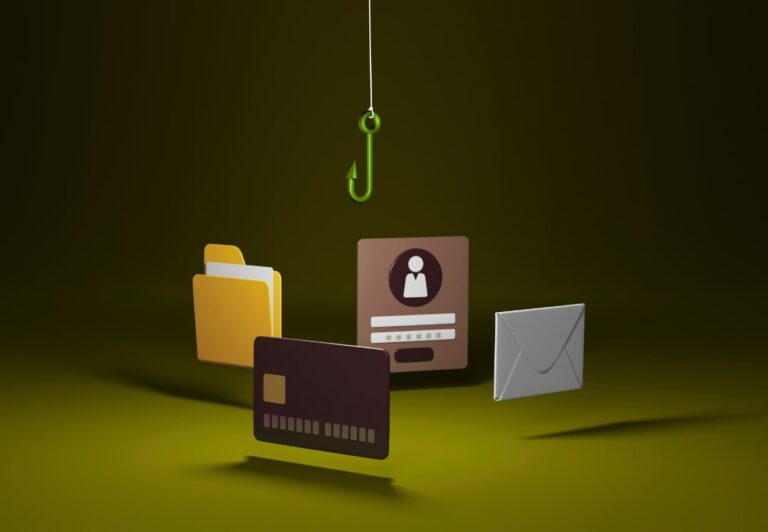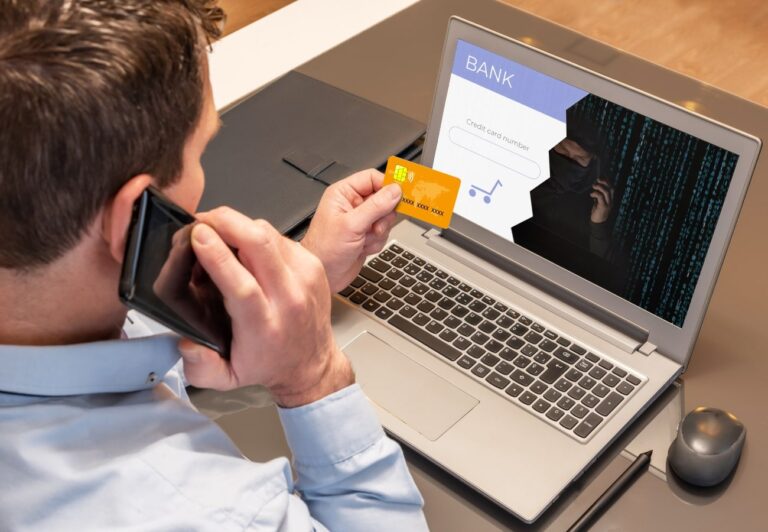Financial scams are a growing threat to our hard-earned money in our digitally connected world. This guide is your shield, offering insights and strategies to help prevent scams and fortify your financial security.
As technology advances, so do the tactics of bad-intentioned people, from phishing schemes to complex investment frauds. Whether you’re an experienced investor or new to the digital financial landscape, this guide empowers you to make informed decisions.
Explore common scams, identify red flags, and implement proactive measures. By the end, you’ll be able to recognize and prevent scams. Let’s begin. In the world of online transactions, scams can be tricky. Let’s break down the common scams you might come across and how to stay sharp against them.
Spotting Phishing Tricks
Phishing is when scammers pretend to be trusted sources to trick you into sharing personal info.
To stay safe, check emails for weird sender addresses, be careful with urgent messages, and always double-check website links before sharing any info. Real places usually won’t ask for your private details out of the blue.
Also, keep an eye out for common tricks, stay updated on new ones, and think about using good security software for extra protection. Being careful online helps you steer clear of phishing scams and keep your personal info in good hands.

Investment Scams Uncovered
These scams come in various forms, promising lucrative returns on investments but ultimately aiming to defraud investors. Common tactics include offering unrealistically high returns, using pressure tactics to push quick decisions, and creating a sense of urgency. Investors are urged to exercise caution and conduct thorough research before committing funds to any opportunity.
Legitimate investment opportunities are typically presented through reputable channels. Verify the credentials of individuals or firms offering investment opportunities and seek independent advice before making any financial commitments.
If an investment opportunity seems too good to be true, it probably is. Staying informed, conducting thorough research, and trusting your instincts can help you steer clear of potential scams and make more sound financial decisions.
Educating oneself about common identity theft tactics and staying vigilant in online and offline transactions are key steps in preventing scams.
Identity Theft Demystified
This is a form of fraud in which an individual’s personal information is unlawfully acquired and used by someone else, typically for financial gain. This stolen information may include details such as Social Security numbers, credit card numbers, bank account information, and other personally identifiable information.
To prevent identity theft start by maintaining strong and unique passwords for online accounts, regularly updating them, and utilizing two-factor authentication whenever possible. Be cautious about sharing personal information online, especially on public platforms. Additionally, safeguard sensitive documents by storing them securely and shredding any unnecessary paperwork containing personal details.
Regularly monitor financial statements for any unauthorized transactions and obtain free annual credit reports to check for unusual activity. If you have to deal with sensitive information all the time you should consider using identity theft protection services for an added layer of security.
Educating oneself about common identity theft tactics and staying vigilant in online and offline transactions are key steps in preventing identity theft and maintaining personal security. Let’s break down some common red flags that can help you steer clear of potential scams.
- Unusual Requests or Urgency: Stay alert and be cautious if someone asks for money or personal info out of the blue. Scammers often make things seem urgent. If it feels rushed, take a moment to think it over.
- Too Good to Be True Offers: Trust your gut, if an offer sounds too good to be true, it likely is. Question big promises or crazy rewards. Before jumping into exciting deals, do some research. Legit opportunities can handle a bit of scrutiny.
- Poor Website Security: Check for “https://” and make sure websites use “https://” for secure connections. No “s”? It might not be safe. If a site has spelling mistakes or looks unprofessional, it could be a scam.
- Unsolicited Communication: Be Wary if you get unexpected emails or calls asking for personal info, be on guard. Unsolicited messages might be trouble. Always verify who’s reaching out, legit contacts won’t mind you checking to be sure.
- Vague or Unprofessional Communication: If a message seems off or unclear, trust your instincts. Legit folks communicate clearly. Don’t hesitate to ask for more details. Scammers might stumble when you dig a bit deeper.
Safeguarding your online presence is not just a choice; it’s a necessity. Let’s take a look into critical measures to enhance your online security, focusing on the importance of strong passwords and two-factor authentication, coupled with practical tips for secure online transactions and cultivating safe browsing habits.
Strong Passwords: Your First Line of Defense
Creating robust passwords serves as the initial barrier against unauthorized access. Ensure your passwords comprise a combination of uppercase and lowercase letters, numbers, and symbols.
Steer clear of predictable choices like birthdays or common words and update regularly your passwords to add an extra layer of security, preventing potential breaches.

Two-Factor Authentication (2FA): Adding an Extra Layer
Two-factor authentication provides an additional shield to your accounts. Wherever possible, enable 2FA to enhance security. Explore diverse 2FA methods, including SMS codes, authenticator apps, or biometrics.
Monitor login attempts and authorization requests, allowing you to promptly address any suspicious activities.
Let's wrap this up plain and simple. Protecting your money from scams isn't just a good idea; it's a must.
Safe Browsing Habits: Navigating the Web Securely
Cultivating safe browsing habits is fundamental to a secure online experience. Keep your software updated, including your operating system, browsers, and security software, to patch potential vulnerabilities.
Exercise caution by avoiding suspicious links and verifying the authenticity of emails and websites to thwart phishing attempts. Additionally, install and regularly update a reliable antivirus program to detect and remove potential threats.
Incorporating these online security measures into your digital routine transforms your online presence into a fortified stronghold. Proactivity in your approach to online security is not just a recommendation; it’s your key to a safer and more secure digital experience. Encountering a potential scam can be a disconcerting experience, but being prepared and knowing how to react is crucial.
This section is designed to guide you through the steps of reporting scams and responding effectively to protect yourself and others.
- Recognizing a Scam: After reading this blog you will have the necessary information to do it. If something feels off like unsolicited messages, unexpected requests, or offers that seem too good to be true you need to be cautious and confirm the legitimacy of the communication by independently verifying the identity of the sender.
- Cease Communication: In the event of suspicion, cut off communication immediately. Refrain from responding to emails, messages, or phone calls. Utilize blocking features on messaging platforms and report the scam to the relevant platform or authorities.
- Report to Authorities: If you believe you have fallen victim to a scam, promptly report the incident to your local law enforcement agency. For online scams, report to relevant internet crime agencies or use cybercrime reporting platforms to ensure appropriate action is taken.
- Financial Institutions: If financial transactions are involved, contact your bank without delay to report the potential scam. Dispute any unauthorized charges swiftly to mitigate the financial impact and protect your assets.
- Educate Others: Sharing your experience is a powerful way to raise awareness. Inform friends, family, or online communities about the encountered scam. Encourage others to remain vigilant and share information about common scams to prevent further victims.
- Seek Professional Assistance: Reach out to consumer protection agencies for guidance and assistance in navigating the aftermath of a scam. If necessary, consult legal professionals to understand your rights and explore potential courses of action.
- Reinforce Security Measures: In the aftermath of a scam, update passwords for affected accounts to prevent unauthorized access. Consider implementing additional security measures, such as enabling two-factor authentication, to enhance your overall online security.
By recognizing red flags, ceasing communication, reporting to authorities, and educating others, you contribute to a collective effort to combat scams and protect the broader community.
Staying aware and proactive is key to minimizing the impact of scams on individuals and society.
Let’s wrap this up plain and simple. Protecting your money from scams isn’t just a good idea; it’s a must. We covered the tricks scammers pull, the deal with strong passwords and two-factor thingamajigs, and how to keep your personal info on lockdown.

Be the one who spreads the word and helps everyone stay ahead of the game. Recognizing common tactics empowers individuals to navigate the digital landscape with confidence, fostering a proactive defense against potential threats.
This guide is to keep yourself well informed and use it to reduce the risk of falling prey to scams.
If you want a free no-obligation consultation about finances, accounting, taxation, and business consulting please contact us at (647) 484-0909.
KPAG Consulting



